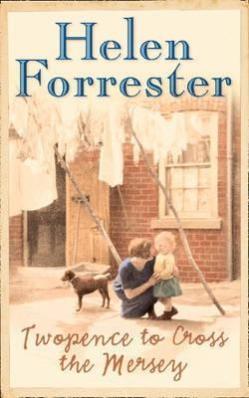 This is the poignant account of a poverty-stricken childhood in Liverpool during the 1930s, and the brilliant first volume of Helen’s autobiography. One of the most harrowing but uplifting books you will ever read.
This is the poignant account of a poverty-stricken childhood in Liverpool during the 1930s, and the brilliant first volume of Helen’s autobiography. One of the most harrowing but uplifting books you will ever read.
Anyone who has enjoyed the Frank McCourt books is going to be equally moved by this magnificent testimony to a little girl’s courage.
Order a copy of Twopence to Cross the Mersey today from Amazon.ca or Amazon.co.uk.
When Helen Forrester’s father went bankrupt in 1930 she and her six siblings were forced from comfortable middle-class life in southern England to utmost poverty in the Depression-ridden North. The running of the household, in slum surroundings and with little food, and the care of the younger children all fell on twelve-year-old Helen. She writes about her experiences without self-pity but rather with a rich sense of humour which makes her account of these grim days heartwarmingly funny as well as shockingly moving.
Critical praise
‘It was the biography that I would have written if my parents had not been given benefits, if they’d had to rely on parish hand outs … [I] want to press this book into your hands and go, “You must read this.” — Caitlin Moran
‘Remarkable that from so bleak and unloving a background came a writer of such affectionate understanding and unsettling honesty.’ — Sunday Telegraph
‘What makes this writer’s self-told tale so memorable?… An absolute recall, a genius for the unforgettable detail, the rare chance of subject’ — The Good Book Guide
‘Should be long and widely read as an extraordinary human story and social document’ — Observer
Helen’s notes
Helen Forrester painstakingly re-created conversations to make the book as life like and readable as possible. Here is what she said about this: ”
I still have living five brothers and sisters and between us we were able, knowing our own speech parents, to reconstruct fairly accurately some of the conversations. Some are seared on my memory, like the ones with the old man in the park, God bless.
Helen reflected on the impact of this period on her life:
“I do not regret the terrible experiences I went through as a child or the sorrows that we all enjoy as we go through life. They have all helped me to become a more compassionate and understanding human being, which I feel I might never have become if I had continued in the very comfortable upper-middle-class life into which I was born.
“Spiritually, I had a pretty solid base in God and a touchingly innocent belief that He knew best what he was doing with me. Also, there was much suffering all round me, and misery loves company. A very great deal of our suffering can be laid squarely at the feet of our parents, and it was only when I was about 16 that I realised that they really did not care much; they had no training or experience to help them with their offspring’s, so one cannot blame them altogether. I am a great advocate for pre-marital courses and similar ones on parenting!
“I was careful when writing Twopence, not to overwrite, not to make it worse than it was. Looking back, I realise that I was treated intolerably badly, with no garden all about what would happen to me; but it is not in the book. Even in my early childhood, when we were quite comfortably off, I was badly treated. Nowadays, I would have been taken into care.
“I kept going because I was frightened that worse might happen to me, if I ran away. Boys ran away to sea and girls ran away to London. The girls went onto the streets and got terrible diseases. I was also very frightened of being picked up and put in the workhouse. If you have read Charles Dickens books, you will know about workhouses.”
Find out about the highly successful stage play of Twopence.